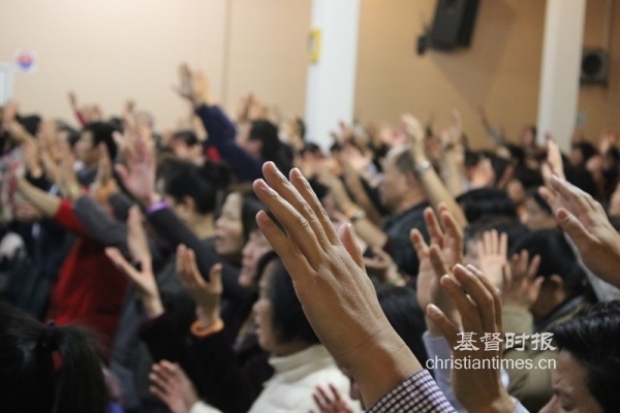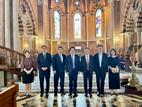Rev. Cui is the pastor of a house church in a major city of central China. He has been a Christian for 15 years, attending services and serving in a traditional Chinese church from 2002 to 2011. However, the church attendance declined from around one thousand at its height to just dozens.
Through the process, Cui saw many ills of the hidebound church. In 2011, he moved his family to his current city and founded a new church. Experiencing hardships and difficulties, he clung to building an open church. In his eyes, his church is identified as a new "open" urban church.
This kind of openness refers to a church that is financially transparent with its service time and location, and holds services and worships God with a relaxed, free, and solemn style. Compared with traditional churches whose members are mostly elderly and women, the new church consists mainly of men and young people. The former church emphasized the law, authority, and obedience, while the latter one stresses grace, equality, and communication.
What then is an "open" church? Cui explained it with his church as an example:
First of all, it doesn't force believers to commit to a certain church, holding that they have the right to choose a church. Secondly, a church doesn't belong to pastors or church leaders alone, but the congregation.
Below is the testimony of Cui's faith experience and how his church has been transformed from complacency and conservatism into renewal:
My faith journey started in a traditional and conservative church in Wenzhou where I stayed for around a decade. It had a background with China Inland Mission. Later I studied Reformed Theology. Although my faith became systematic, I became more conservative, closed and extreme in many respects.
At that time male and female believers were not allowed to sit together. What was worse, women were forbidden from having their hair dyed or permed, wearing short skirts, camisoles or bardot tops, and applying heavy make-up. Furthermore, only two cups were used in the communion service. One cup was passed front-to-back from one brother to another with each of them drinking in turn. The other was used the same way by the sisters. Because of this, when it came to the Lord's supper young people who sat at the back rushed to the first row so they could take a sip earlier and avoid others' saliva.
There were also three distinct points in conservative thinking of the church:
1. Its failure to respect differences resulted in a bad brain drain.
Pastors were fond of well-behaved and obedient people, but they regarded creative people who had ideas as disobedient. The latter were either turned off or could not stay any longer and left...
2. The congregation criticized professional preachers.
To meet nurturing needs the church, which had volunteer preachers responsible for sermons, began to hire some professional preachers. Since some of the preachers were young, professional, and inexperienced without gifts, they were contrasted to the volunteer preachers. Some believers claimed, "Preacher X gave better sermons than you, is more eloquent and capable than you, and he doesn't get paid or he donates the money..." Since the professional preachers were generally young with less experience and ability compared to veteran volunteer preachers, they who received low wages also faced mental and financial pressure and were painful and depressed.
3. The church only belonged to its leader.
If a church had a charming leader, it tended to be united with clear-cut goals. However, the church would tumble and the workers disobeyed each other if the leader left. This shocked me. The number of the congregation of my first church decreased from about one thousand in the beginning to only dozens.
I arrived in this city with two other church workers in 2011. We had a clear goal of establishing a church.
Why did we want to set up an "open" church? There were three reasons.
1. We were rejected by other local churches.
My family of three and another brother didn't have jobs and so had great financial pressure. At first we set up a temporary store and sold things online. We four people slept on makeshift beds on the floor and ate simple meals because we didn't have steady incomes. During those tough days we felt the fickleness of human relationships --- we were rejected by other churches and local pastors were unfriendly to us since the urban churches were in chaos and isolated. The Bible teaches us to love each other and entertain strangers, but the churches rejected Christians. They failed to comply with the Bible's teaching.
In that difficult time we kept reflecting on the church and denominations to figure out what kind of church pleases God and also helps believers.
2. Change the evangelism methods. In the early days of our church, we tried several evangelism methods. We started with a traditional one, the distribution of gospel tracts, but it didn't work. People seldom came to church because of this method.
I like the Internet and am an active Internet user. Gradually I found that 80% of newcomers come here through the Internet.
3. Some churches fear that they may be persecuted as soon as they publicize their gathering time and addresses.
Actually they have a misunderstanding about "persecution". Our church is totally transparent and public in service time, address and finance. "Persecution" doesn't come from making the gathering place public.
An open church is advantageous in three aspects:
First, the relationship between the congregation and us is simple. We needn't pretend much when getting along with each other. Second, those who remain in the church gain financial independence and an independent personality. Third, it develops people with independent thinking. Generally speaking, people who were greatly hurt in the past leave the church easily, for they are inwardly sensitive. Sometimes sermons concern some realistic problems and they are inclined to think that it's talking about them, and their feelings are hurt. A large percentage of people come to church just to find spiritual sustenance and the security of interdependence rather than change themselves and face their own problems. Moreover, they don't dare probe into their problems, let alone confront them.
Of course, there are also disadvantages:
Primarily, believers don't show enough respect to pastors. It doesn't stress the church's authority and pastors and congregants communicate on an equal basis, but this leads some people influenced by traditional thoughts to despise pastors. They also see the church and pastors from a worldly point of view, going in for pomp, background and authority.
Secondly, seekers are prone to change their role. A portion of seekers who have no understanding of Christianity still handle interpersonal relationship with the former ideology, and even strive for a say in the church by making large donations.
Translated by Karen Luo
http://www.christiantimes.cn/news/23490












